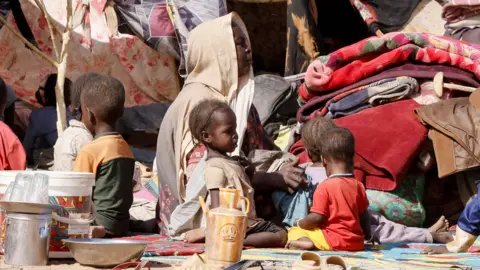War crimes being committed in Sudan, ICC believes
 Reuters
ReutersThere are "reasonable grounds" to believe war crimes and crimes against humanity are being committed in western Sudan, said the International Criminal Court (ICC) at the United Nations Security Council on Thursday.
Targeted sexual violence against women and girls of specific ethnicities was named as one of the most disturbing findings to emerge from an ICC investigation into crimes committed in Darfur.
War broke out between the Sudanese army and the Rapid Support Forces (RSF) in April 2023, leading to what the UN calls "devastating civilian casualties".
ICC Deputy Prosecutor Nazhat Shameem Khan said it was "difficult to find appropriate words to describe the depth of suffering" in the region.
Her conclusions have been drawn from "over 7,000 evidence items collected to date", she said, praising "brave" survivors for sharing their testimony.
The UN Security Council first gave the ICC a mandate to investigate and prosecute crimes in Darfur two decades ago, with the body opening multiple investigations into war crimes and genocide committed in the region from July 2002 onwards.
The ICC launched a fresh probe in 2023 after the nationwide conflict between the army and the RSF broke out across the country, interviewing victims who had fled fighting in Darfur to neighbouring Chad.
Ms Khan described an "inescapable pattern of offending", and stressed that the team was working to translate such crimes into evidence for the court.
She said that those committing crimes in Darfur "may feel a sense of impunity at this moment".
But the ICC was working to ensure that "many" people would face justice at the ICC over what was happening in the region, she warned.
Allegations of war crimes have persisted throughout the past two years, and in January 2025 the US determined that the RSF and allied militias had committed a genocide against the region's non-Arab population.
The RSF has denied the claims, and said it was not involved in what it describes as a "tribal conflict" in Darfur.
Reports from the UN indicate that conditions in Darfur have continued to worsen, with hospitals and humanitarian convoys suffering targeted attacks, and food and water deliberately withheld.
"Rape and sexual violence are being weaponised," said ICC Deputy Prosecutor Khan on Thursday. "Abductions for ransom or to bolster the ranks of armed groups have become common practice."
Civilians in the city of el-Fasher have been cut off from aid due to a siege by RSF forces, and an outbreak of cholera across conflict zones poses a serious threat to already scarce water supplies.
An escalating famine has gripped the region, with the UN's children's agency (Unicef) reporting that more than 40,000 children were admitted for treatment due to severe acute malnutrition between January and May 2025 – more than double the number admitted in the same period last year.
"Children in Darfur are being starved by conflict and cut off from the very aid that could save them," said Sheldon Yett from Unicef.
In the past two years, more than 150,000 people have died in the conflict and approximately 12 million have fled their homes, but Ms Khan warned: "We should not be under any illusion - things can still get worse."
Additional reporting by Natasha Booty
 Getty Images/BBC
Getty Images/BBCGo to BBCAfrica.com for more news from the African continent.
Follow us on Twitter @BBCAfrica, on Facebook at BBC Africa or on Instagram at bbcafrica
